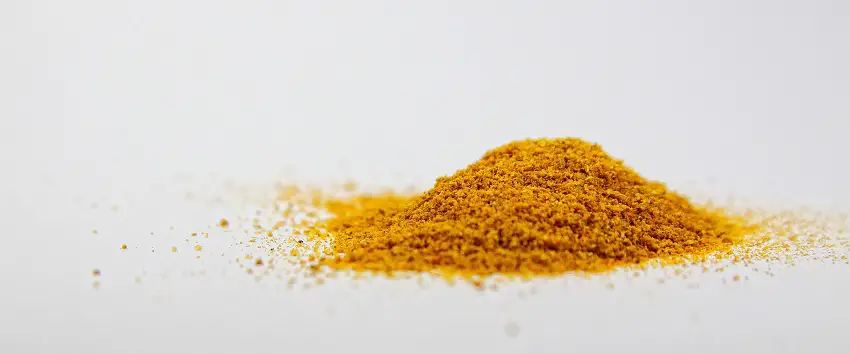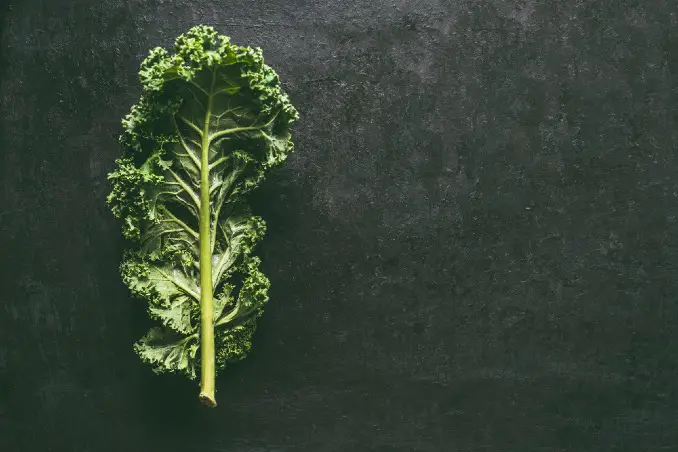Turmeric is one of the healthiest spices available. It can help you in a variety of ways – from improving immunity, reducing inflammation, to helping with weight loss.
Turmeric brain benefits Intro
According to numerous studies, turmeric doesn’t just pack a punch when it comes to boosting your physical health – it’s a powerful mental performance booster too.
In this article, we’re taking a look at 10 science-backed turmeric brain benefits.
What is Turmeric?
Turmeric is a spice derived from the root of flowering plant Curcuma Longa.
People often buy it as a spice in jars. What you’ll see less often though, is fresh turmeric, which looks like ginger, except it has a more intense orange color. Turmeric is a staple ingredient in Ayurveda and it’s one of India’s best brain food.
It helps you:
- Fight inflammation & oxidative stress
- Improve neuron communication
- Reduce anxiety and depression by balancing your brain chemicals
Thanks to curcumin, its active compound, turmeric belongs to best brain foods out there. Turmeric brain benefits are plenty, and here we’re going to explore them in more detail.
Turmeric Brain Benefits: The List
Increases Brain-Derived Neurotrophic Factor
It wasn’t long ago that science thought our brains stop growing and changing after puberty. However, recent discoveries prove otherwise. Our brain keeps reshaping and changing throughout life. (7)
It constantly forms new neurons and creates new neuronal connections depending on our life experiences and other factors.
One of the main triggers of this process is Brain-Derived Neurotrophic Factor, or simply BDNF. BDNF is like a growth hormone for your brain.
- However, various factors such as aging and stress can negatively affect your BDNF. (8)
What’s worse, low BDNF levels are shown to lead to depression, Alzheimer’s, and other brain disorders. (9)
The active ingredient of turmeric, curcumin, is shown to increase BDNF levels in the brain. (10) As a result, it may positively affect your mood, memory, and cognition. Speaking of which…
Improves Your Memory
Curcumin also helps to improve your memory. (11)
It doesn’t just boost your brain growth hormone to form new neurons. It also provides protection for the existing brain cells.
By bolstering your brain’s defense systems, turmeric may ultimately help your brain work better. Leading to faster communication between neurons.
>>You May Also Like: Brain Food: 52 Foods For Peak Mood & Cognition
Fights Depression Naturally
Believe it or not, depression can shrink your brain; reducing the size of the hippocampus. (7)
Curcumin in turmeric is shown to be surprisingly potent at relieving depression.
A study compared the effects of Prozac (a popular prescription anti-depressant) vs curcumin on depression.
The researchers split 60 people into three groups. One group took Prozac, the second group a curcumin supplement, and the third group took both Prozac and curcumin. After less than 2 months, curcumin was shown to offer the same results as Prozac.
The group that took both Prozac and curcumin together saw the biggest improvements. (12)
These results have, however, been derived from relatively small sample sizes, therefore, further research, particularly in areas where turmeric is uncommon in dietary regimes, would be required to clear the picture (17; 18).
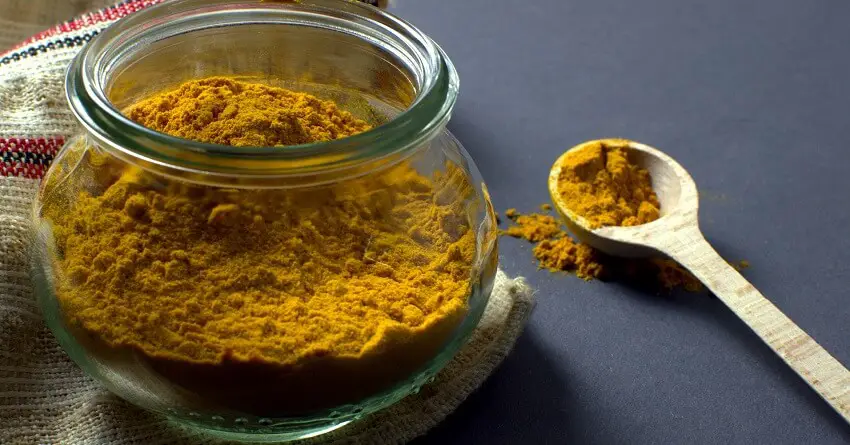
The takeaway?
Thanks to its active compound curcumin, turmeric may act as a natural anti-depressant.
And it may even be able to reverse the changes to the brain induced by depression; such as the shrinkage of the hippocampus. (13)
Boosts Your Focus & Motivation
Next up on the list of turmeric brain benefits are focus and motivation.
See, active ingredients in turmeric boost your dopamine and serotonin. (14, 15)
These two brain chemicals are key to good mood, strong motivation, and sharp focus.
In fact, dopamine is what drives you to achieve your goals, and it’s what makes you feel good when you accomplish them.
Low dopamine levels are linked to irritability, mood swings, and even ADHD.
On the other hand, low serotonin is often associated with depression, insomnia, and many other health problems.
By supporting your neurotransmitters, turmeric may help to alleviate some of these symptoms.
May Protect Against Alzheimer’s
According to Healthline, chronic low-level inflammation may be another culprit for developing Alzheimer’s.
You’ve guessed it – turmeric can help here too.
It has extremely strong anti-inflammatory effects. So much so, that it matches the effectiveness of some anti-inflammatory cures. (16)
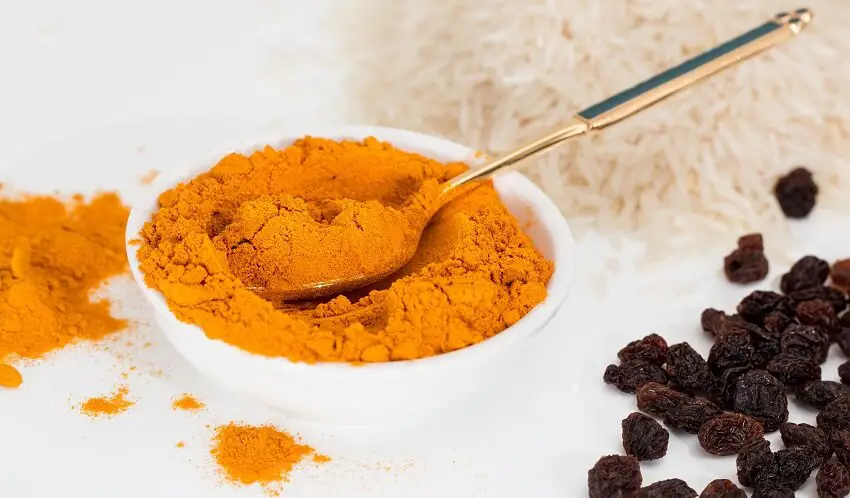
Relieves Stress & Anxiety
Neurotransmitters like serotonin and dopamine are important for our health and well-being.
When these two get out of whack, symptoms such as anxiety can ensue.
When you’re stressed, your feel-good brain chemicals often go down while cortisol, the main stress hormone, rises.
Interestingly, curcumin is shown to reverse the changes to the brain caused by chronic stress. A 2018 study suggests that curcumin (the main ingredient of turmeric) actually supports a biochemical balance in the striatum, hippocampus, and amygdala.
These are areas of your brain that regulate emotions. (1)
Helps You Get to Sleep Faster
We know that turmeric is an anti-inflammatory food at its essence.
It reduces oxidative stress, lowers your blood sugar levels, boosts your immune system, eases your digestion, and enhances brain neurotransmitters.
All of these things will help you to get to sleep more easily and wake up refreshed.
Quenches Inflammation
Curcumin may be the strongest ingredient in turmeric for reducing inflammation, but other ingredients play a role too. They all work together to boost your body’s antioxidant capacity. This, in turn, reduces cellular damage and improves how your brain works.
The other benefit of reduced inflammation is that you’ll feel better. And here’s why…
There’s an amino acid which we get from food, it’s called L-tryptophan. Your brain needs it to make serotonin. However, chronic inflammation is shown to alter tryptophan synthesis, leading to low serotonin levels and consequently low mood.
(2) One of the hypotheses for this is that inflammation causes your body to use tryptophan to create more white blood cells, instead of using it to make serotonin.
Turmeric For OCD
OCD or obsessive-compulsive disorder is among the most common types of mental illness out there.
It’s characterized by feelings of having to perform a certain ritual or pattern of behavior.
Obsessions are anxiety-causing thoughts. Compulsion is the behavior you to do alleviate that anxiety.

For example, we all double or triple check if the door is locked from time to time. But OCD is when you can’t stop thinking about it even after you’ve checked the door multiple times.
You feel the compulsion and need to do it again and again, even if you don’t want to do it – and even if it makes your life more complicated. OCD is a repeated behavior that can greatly reduce the quality of one’s life. The constant thoughts and worries about doing certain things can be debilitating.
As it turns out though, turmeric may help with OCD. It’s shown to greatly reduce anxious and obsessive thoughts. At the same time, it relieves the need to do compulsive behavior. A study stated:
“Curcumin treatment had shown a protective effect in OCD with considerable influence on brain monoamine levels“. (3)
Alleviates Brain Fog
Brain fog is often characterized by poor memory and inability to focus on your tasks.
There are many potential causes of brain fog. But often at the root of it all is inflammation. Experts suggest that chronic inflammatory conditions, such as Rheumatoid Arthritis can actually cause brain fog and poor focus. (4)
Since turmeric is one of the most potent anti-inflammatory foods in nature, it will help to reduce your brain fog caused by inflammation.
Turmeric vs Curcumin: Is There a Difference?
Turmeric is a spice that comes from the root of Curcuma Longa, which belongs to the same plant family as ginger.
Curcumin is one of the ingredients in turmeric. It only makes up 2-8% of total turmeric content, and it’s responsible for its intense color and flavor. It’s also responsible for many of its positive effects on your brain and body.
Shared Health Benefits
According to Healthline, turmeric and curcumin share many of the same health benefits:
- Help fight obesity by lowering inflammation and regulating body fat
- Reduce osteoarthritis
- Brain health
- Minimize levels of cholesterol and triglycerides
- Improve blood sugar and mood
- Protect the liver*
- Antibacterial & antifungal
* Caution must be taken in intake quantity, frequency, and duration as hepatotoxicity has been a matter of concern recently (19).
Differences
Now that we listed common things between turmeric and curcumin, shall we look at their differences?
First off, curcumin is an isolated compound.
Turmeric, on the other hand, is the complete package. It contains not only curcumin but many other beneficial compounds. These compounds work together to give you stronger effects than you’d get from curcumin alone.
For example, there is a another ingredient in turmeric called curdione. By itself, it’s a potent anti-fungal compound. However, when it naturally works together with other compounds in turmeric, its effects on stopping fungal growth are even stronger.
As far as brain health goes, turmeric offers additional benefits in this area too.
It’s shown to be effective for preventing and even treating Parkinson’s Disease, a disease characterized by clinically low brain dopamine levels. (4, 5)
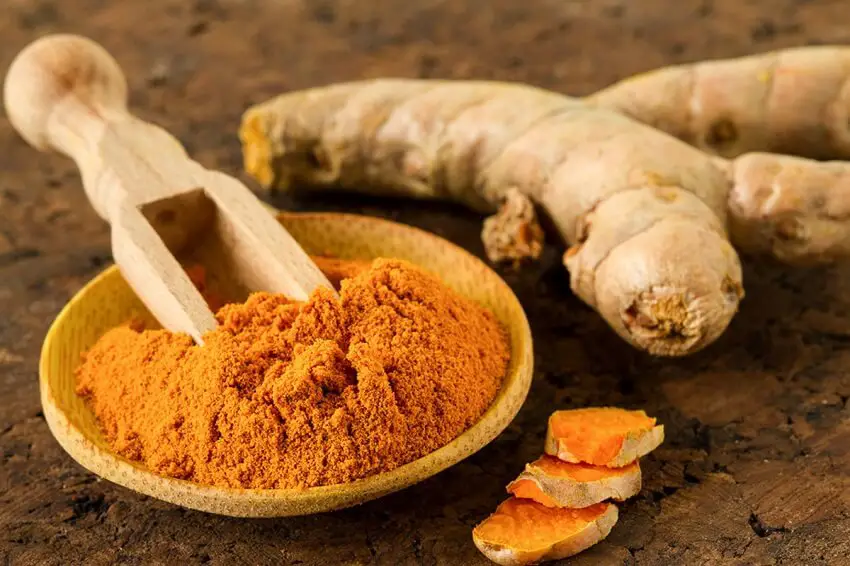
Turmeric Dosage
Most studies that tested turmeric’s health benefits used between 500-2,500mg of turmeric supplements per day. It’s worth pointing that they often used turmeric extracts high in curcumin.
Naturally, turmeric only contains 2-8% of curcumin. However, supplements tend to have up to 95% curcumin. These are much higher dosages than what you’ll find in nature. That’s why we at Valentino’s Naturals feel turmeric extract supplementation is inferior to consuming real turmeric.
Natural Turmeric vs. Supplements
It’s best to consume the spice in its whole form by adding as a spice while cooking, or mixed with milk or water – just like it’s been done for thousands of years.
In fact, research has found that simply consuming more curry in your meals can improve your cognitive performance and mental health. As a result, there’s no need for extra high dosages of curcumin supplements.
How to Take Turmeric For Best Absorption
Bioavailability of metabolites from turmeric is limited, thus multiple combinations have been devised.
However, artificial enhancement of bioavailability may lead to problems (20), therefore, it would be best taken naturally as mentioned above i.e. adding as a spice while cooking, or mixed with milk or water. Precaution must be taken in optimization of dosage.
Is Turmeric Safe to Take Every Day?
Carrying on our previous point, many people eat foods cooked with turmeric every day. This natural way of consuming turmeric is safe for most people who have been eating turmeric containing meals since their early ages.
Systemized and well-researched introduction of turmeric is advised in areas where turmeric has been uncommon in culinary settings.
In addition, avoid consuming turmeric, be it from food or supplements, if you have the following:
- Conditions where you have to take blood-thinning medications. Turmeric can thin the blood so combining it with these can lead to potentially dangerous side effects.
- Kidney stones. Turmeric contains oxalates which bind to calcium and may form kidney stones if you’re prone to them.
- Bleeding condition. Turmeric may reduce your blood’s ability to clot.
- Diabetes. Turmeric might drop your blood sugar levels too low in this case.
- A deficiency in iron. Turmeric may negatively affect iron absorption from food.
Also, if you have any other condition, talk to your doctor before taking turmeric.
We’re not medical professionals and do not offer medical advice, so it’s always best to check with your healthcare provider if you have any questions. Same goes for dosage, frequency and duration of turmeric ingestion.
Top Questions About Turmeric
Is turmeric good to drink every day?
There’s a trend of drinking turmeric shots these days. So far, evidence hasn’t shown any adverse effect on drinking turmeric every day. However, you may want not to overdo it with the dosage especially if you are not adopted to its intake.
Most research has used doses of 500-2,500mg of turmeric supplements per day. As long as you don’t have any medical conditions that would interfere with turmeric, you can drink it in moderation. However, we advise consulting your doctor prior to making it a daily routine.
How does turmeric help you sleep?
There are a number of effects that turmeric has which improve your sleep. From reduced inflammation to improved blood sugar levels, these are just some of the factors that turmeric optimizes, both of which are important for a good night’s sleep.
So far, there’s not much evidence pointing this to be the case. If anything, turmeric should reduce your anxiety.
It’s shown to enhance brain neurotransmitters that are critical for good mood – these include dopamine and serotonin. And according to Life Extension, turmeric can even reverse some changes to the brain caused by excess stress and anxiety.
Will turmeric stain my teeth?
Turmeric is unlikely to stain your teeth. In the worst-case scenario, it will stain them only temporarily. That said, turmeric is a known anti-microbial agent, which means it may help you clean your mouth and teeth from harmful bacteria and other microorganisms.
Does turmeric increase dopamine?
Yes, turmeric can increase your dopamine levels in the brain. According to Healthline, it positively affects your brain chemicals, helping to regulate dopamine and serotonin production.
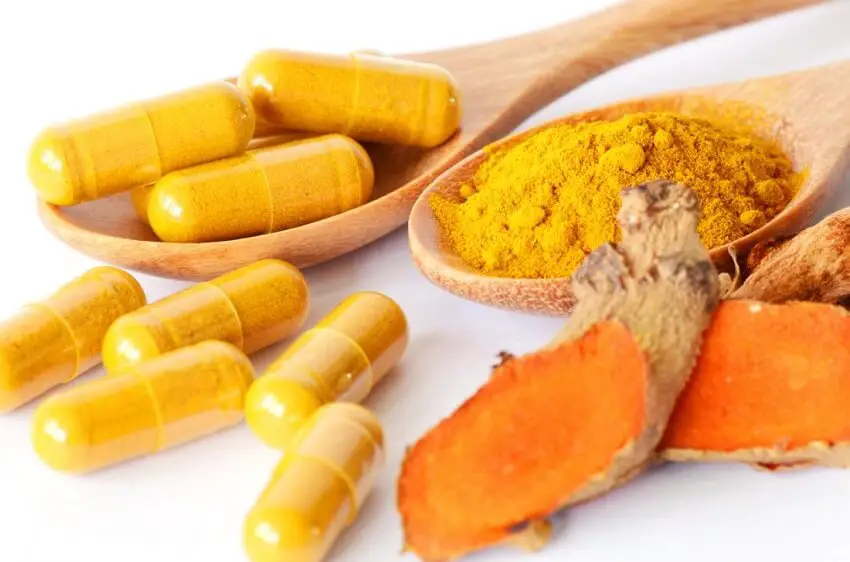
Anything Else to Consider?
While turmeric is a healthy spice, it’s not a cure-all panacea. For a healthy and happy mind, your lifestyle choices should be your top priority.
Training in the gym or playing a sport, eating a colorful and wholesome diet, and sleeping well are all critical for good overall health. Turmeric should be something you sprinkle (metaphorically and literally!) on top of your balanced lifestyle; that’s where it’ll help you the most.
Turmeric Brain Benefits: Final Thoughts
So far, most research points to turmeric as a powerful and healthy spice. However, further research will give more insights about its benefits and/or side effects.
From improved sleep, sharper focus, enhanced mood to better memory, turmeric brain benefits are numerous and powerful.
The key to getting the most out of this amazing spice is to combine it with a healthy lifestyle. This includes a good exercise plan, healthy diet, and plenty of quality sleep.
Now tell me, what are your favorite turmeric brain benefits?
And how did you personally benefit from using this fantastic spice?
I’d love to hear from you in the comments below.
Turmeric brain benefits References
- Systemic Administration of Curcumin Affect Anxiety-Related Behaviors in a Rat Model of Posttraumatic Stress Disorder via Activation of Serotonergic Systems. (source)
- Effects of anti‐inflammatory cures on the expression of tryptophan‐metabolism genes by human macrophages. (source)
- What’s the link between brain fog and rheumatoid arthritis? (source)
- Dose-dependent effect of Curcuma longa for the treatment of Parkinson’s disease. (source)
- Curcuma longa L. extract improves the cortical neural connectivity during the aging process. (source)
- Curry consumption and cognitive function in the elderly. (source)
- 10 Proven Health Benefits of Turmeric and Curcumin. (source)
- Brain-derived neurotrophic factor. (source)
- BDNF mRNA is decreased in the hippocampus of individuals with Alzheimer’s disease. (source)
- Antidepressant-like effects of curcumin in the WKY rat model of depression is associated with an increase in hippocampal BDNF. (source)
- Curcumin improves spatial memory and decreases oxidative damage in aged female rats. (source)
- Efficacy and safety of curcumin in major depressive disorder: a randomized controlled trial. (source)
- Potentials of Curcumin as an Antidepressant. (source)
- Antidepressant activity of curcumin: involvement of serotonin and dopamine system. (source)
- The effects of curcumin on depressive-like behaviors in mice. (source)
- Anti-inflammatory properties of curcumin, a major constituent of Curcuma longa: a review of preclinical and clinical research. (source)
- Fusar-Poli, L., Vozza, L., Gabbiadini, A., Vanella, A., Concas, I., Tinacci, S., Petralia, A., Signorelli, M.S., Aguglia, E., 2022. Curcumin for depression: a meta-analysis. Crit. Rev. Food Sci. Nutr. 60, 2643-2653.
- Lombardi, N., Crescioli, G., Maggini, V., Ippoliti, I., Menniti-Ippolito, F., Gallo, E., Brilli, V., Lanzi, C., Mannaioni, G., Firenzuoli, F., Vannacci, A., 2022. Acute liver injury following turmeric use in Tuscany: An analysis of the Italian Phyto Vigilance database and systematic review of case reports. Br. J. Clin. Pharmacol. 87, 741-753.
- Ramaholimihaso, T., Bouazzaoui, F., Kaladjian, A., 2022. Curcumin in Depression: Potential Mechanisms of Action and Current Evidence—A Narrative Review. Frontiers in Psychiatry 11.
- LiverTox: Clinical and Research Information on Drug-Induced Liver Injury [Internet]. Bethesda (MD): National Institute of Diabetes and Digestive and Kidney Diseases; 2012-. Turmeric. [Updated 2022 May 11]. Available from: https://www.ncbi.nlm.nih.gov/books/NBK548561/
Turmeric brain benefits VERIFIED BY:
This article has gone thorough fact checking by Ahmad Mahmood, Ph.D. from Professional Writings.
Although the quoted facts have been found consistent with literature, yet the literature keeps on growing and new scientific insights and discoveries replace the old.
Therefore, consultations with your physician about dosage, frequency, and duration of turmeric intake are advised.
Ahmad Mahmood has a background of studying and exploring ‘food as medicine’ and has expertise in plant metabolomics, and currently works as a freelance academic writer, editor and proofreader. He can be reached at Twitter.


